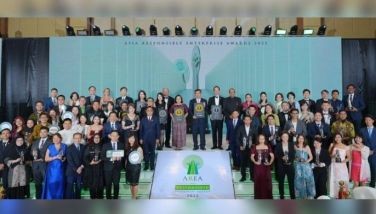‘Philippines committed to end impunity’
MANILA, Philippines - The Philippines has reiterated its commitment to fight impunity and ensure that perpetrators of international crimes are punished.
Philippine Ambassador to the Netherlands Jaime Victor Ledda reaffirmed this pledge during the 14th Assembly of the States Parties to the Rome Statute, held in The Hague from Nov. 18 to 26.
The delegation was composed of representatives from the Philippine embassy in The Hague and the Permanent Mission in New York.
In his statement at the plenary, Ledda emphasized that “since becoming a founding member of the United Nations 70 years ago, the Philippines has always advocated for the rule of law in support of peace and security, human rights and development.”
Ledda also stressed the importance of achieving the Rome Statute’s universality and joined the call for more countries to ratify or accede to the Rome Statute, particularly from the Asia-Pacific region.
He recalled that the Philippines enacted Republic Act No. 9851 in 2009, or the legislation on Crimes against International Humanitarian Law, Genocide and Other Crimes Against Humanity, which paved the way for the Philippine ratification of the Rome Statute.
The ambassador said the Philippines supports the proposed “Code of Conduct regarding the UN Security Council action against genocide, crimes against humanity or war crimes,” which calls on the five permanent members of the council to refrain from using their veto power in situations involving crimes of mass atrocity that fall under jurisdiction of the Court.
“It is our common interest to uphold the credibility of both the Court and the Security Council,” Ledda said.
Ledda took the opportunity to thank once again the States Parties for electing Raul Pangalangan as judge of the court in June this year.
Citing the constitutional policy of the Philippines that recognizes and supports the contribution of civil society to nation building, Ledda expressed the view that civil society also has a role to play in making international criminal justice work. He then invited the delegates to attend the side event on Nov. 20 which the Philippines would co-host, with Open Society Justice Initiative (OSJI).
The “Civil Society and the International Criminal Court: Local Perspectives on Fact-Finding” tackled different perspectives on how the ICC and States Parties need to support the fact-finding efforts of local nongovernment organizations and civil society.
- Latest
- Trending


































